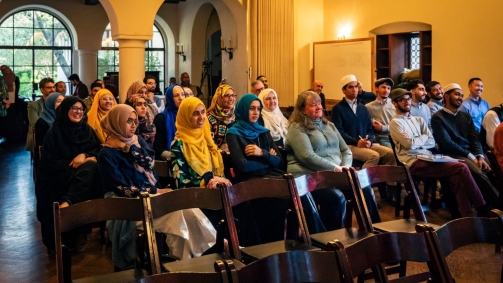Preceptorials
Zaytuna Preceptorial
The Preceptorial at Zaytuna College, first introduced as the Special Reading Course (SRC), represents a modified version of the Oxford tutorial and uses the term Woodrow Wilson introduced at Princeton University in 1905. In preceptorials, a small group of students (or even a single student) meets with a College faculty member for at least the length of a semester to study a single text, a single author, or a narrowly defined theme from the Western or Islamic canons. Thus, preceptorials may be used to further personal interests or explore new areas of study, including topics connected with the senior thesis or experiential learning essays.
The subject matter of a preceptorial is not drawn primarily from the lectures of Zaytuna faculty or from textbooks but from guided reading Zaytuna students undertake to augment their apprehension of the curriculum and to foster lifelong habits of learning. Preceptorials allow students to explore texts within the canon and thus enhance their elective study. Moreover, preceptorials offer a venue for students to profit from the broader expertise of the faculty. Students may also use preceptorials to further their acquisition of the other languages of scholarship, apart from Arabic.
Students with interests in special areas of study may, as individuals or as groups, approach any faculty member to enroll in a preceptorial for a minimum of one and a maximum of three credit hours for undergraduate students, and a minimum of three credit hours for graduate students, per week. The normal maximum number of students in any preceptorial may not exceed three, though an instructor may expand the number of students to as many as seven with the permission of the Provost.
Like the standard courses of the curriculum, preceptorials must include a formal course title and syllabus; required readings; and weekly meetings, the length of which will conform to the number of units agreed upon between instructor and student(s). Graded assignments and/or exams are optional and at the discretion of the instructor. The work done over the course of the semester is graded as pass/fail, and the name of the course appears on the student’s transcript. As with regular courses in the curriculum, attendance is required. Moreover, students who fail to show up to meetings or to meet the course requirements fail the preceptorial. Students who fail a preceptorial are usually not be allowed to take another.
Recent preceptorials include the study of Shakespeare’s Hamlet, Macbeth, King Lear, Coriolanus, and Othello; Boethius’ Consolatio Philosophiæ; Dante’s Divine Comedy; katabasis in Homeric and Roman epics; Plato’s Republic; MacIntyre’s After Virtue; Syed Muhammad Naquib al-Attas’s On Justice and the Nature of Man; Greek; and French for Academic Reading.
Students may also use the preceptorial format to earn a traditional license (ijazah) for work done on a particular text. While the College does not grant such certificates, a qualified faculty member may choose to do so. Using the preceptorial to further work in one’s thesis is highly encouraged.
To initiate a preceptorial, students must reach out to a professor before the start of the semester to reach an agreement about the preceptorial and to determine the class text, method of study, and requirements. The text should be ordered in a timely fashion so it is available during the first week of classes, when the formal studies of the preceptorial begin. If the text is likely to prove hard to find, a PDF copy should be made available if possible. Students must complete the preceptorial registration form (from the Registrar’s Office) by the second Friday of the semester, and the instructor is expected to send an email to the Registrar outlining the preceptorial content and confirming the roster.
Generally speaking, freshman are not allowed to register for preceptorials because the first year of study requires a special focus to lay the foundation for subsequent studies; exceptions may be made on rare occasions to supplement the Arabic program.
While there is no compulsion on the part of the instructor to agree to a student’s request to create a preceptorial, the faculty contract requires, mutatis mutandis, an openness to take on up to two preceptorials per semester.
Additionally:
- No student may take more than two preceptorials per semester.
- A preceptorial cannot take the place of a core course.
- Credit for preceptorials will not be counted toward core course graduation requirements.
- Texts taught by faculty for preceptorials must not be a text currently being taught
in the curriculum.
- No undergraduate student shall be allowed to take preceptorial courses, for credit or to audit, from any faculty member of the master’s program.
Explore the BA Program
BA Course Descriptions
Read course descriptions for the 4-year undergraduate program.
Experiential Learning
A unique holistic education beyond the classroom.
BA FAQs
Common questions for prospective students and parents.




